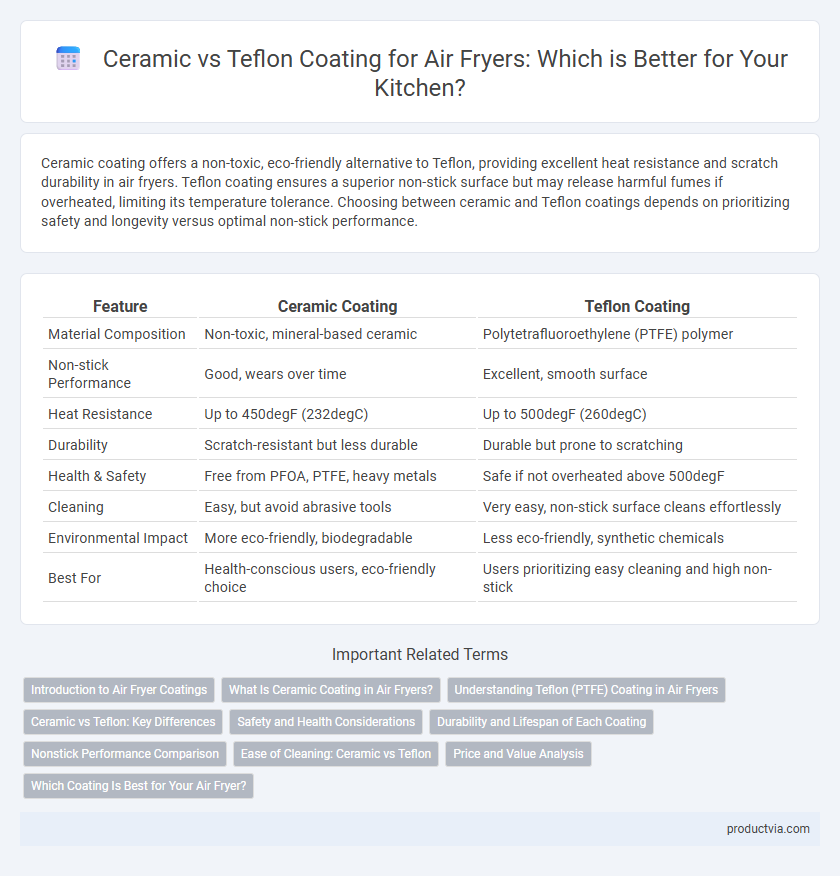Ceramic coating offers a non-toxic, eco-friendly alternative to Teflon, providing excellent heat resistance and scratch durability in air fryers. Teflon coating ensures a superior non-stick surface but may release harmful fumes if overheated, limiting its temperature tolerance. Choosing between ceramic and Teflon coatings depends on prioritizing safety and longevity versus optimal non-stick performance.
Table of Comparison
| Feature | Ceramic Coating | Teflon Coating |
|---|---|---|
| Material Composition | Non-toxic, mineral-based ceramic | Polytetrafluoroethylene (PTFE) polymer |
| Non-stick Performance | Good, wears over time | Excellent, smooth surface |
| Heat Resistance | Up to 450degF (232degC) | Up to 500degF (260degC) |
| Durability | Scratch-resistant but less durable | Durable but prone to scratching |
| Health & Safety | Free from PFOA, PTFE, heavy metals | Safe if not overheated above 500degF |
| Cleaning | Easy, but avoid abrasive tools | Very easy, non-stick surface cleans effortlessly |
| Environmental Impact | More eco-friendly, biodegradable | Less eco-friendly, synthetic chemicals |
| Best For | Health-conscious users, eco-friendly choice | Users prioritizing easy cleaning and high non-stick |
Introduction to Air Fryer Coatings
Air fryer coatings significantly impact cooking performance and health safety, with ceramic and Teflon being the most common types. Ceramic coatings offer a non-stick, chemical-free surface that withstands high temperatures without releasing toxins, making them ideal for healthier cooking. Teflon coatings provide excellent non-stick properties but may degrade at high heat, potentially releasing harmful compounds, requiring careful temperature management during use.
What Is Ceramic Coating in Air Fryers?
Ceramic coating in air fryers is a non-stick surface derived from natural minerals, offering a chemical-free and eco-friendly alternative to traditional Teflon coatings. This coating provides excellent heat resistance and durability, ensuring even cooking and easy cleanup without the risk of toxic fumes at high temperatures. Ceramic coatings promote healthier cooking by minimizing the need for oil and preventing food from sticking to the fryer basket.
Understanding Teflon (PTFE) Coating in Air Fryers
Teflon (PTFE) coating in air fryers offers a non-stick surface that enhances easy food release and simplifies cleaning. This synthetic polymer provides excellent heat resistance but can degrade at temperatures above 500degF, potentially releasing harmful fumes. Understanding the proper use and maintenance of Teflon-coated air fryers ensures safety and prolongs the appliance's lifespan.
Ceramic vs Teflon: Key Differences
Ceramic coatings in air fryers offer a non-stick surface free from harmful chemicals like PTFE and PFOA, promoting healthier cooking compared to traditional Teflon coatings. Teflon coatings provide excellent non-stick properties and durability but can degrade at high temperatures, releasing potentially toxic fumes. Users prioritizing eco-friendliness and heat resistance often prefer ceramic, while those valuing established non-stick performance may choose Teflon.
Safety and Health Considerations
Ceramic coatings on air fryers are free from harmful chemicals like PFOA and PTFE, reducing potential health risks associated with overheating non-stick surfaces found in Teflon coatings. Ceramic surfaces are more resistant to scratches and degradation, minimizing the release of toxic fumes during high-temperature cooking. Choosing ceramic-coated air fryers offers safer, non-toxic cooking options that support long-term health compared to traditional Teflon-coated alternatives.
Durability and Lifespan of Each Coating
Ceramic coatings on air fryers offer superior durability and resist scratches and high temperatures better than Teflon coatings, which are prone to peeling and degradation over time. Teflon coatings typically have a shorter lifespan, often lasting 1-3 years depending on usage and care, while ceramic coatings can sustain their non-stick properties for up to 5 years with proper maintenance. Investing in an air fryer with ceramic coating ensures longer-lasting performance and reduced need for replacement compared to Teflon-based models.
Nonstick Performance Comparison
Ceramic coating in air fryers offers superior nonstick performance with enhanced scratch resistance and higher heat tolerance compared to Teflon coating, which may degrade at high temperatures releasing harmful fumes. Ceramic coatings provide a chemical-free, eco-friendly surface ensuring food releases easily without sticking, while Teflon, made from PTFE, can lose its nonstick properties more quickly under frequent use. Consumers seeking durability and safer cooking often prefer ceramic-coated air fryers for consistent nonstick results over time.
Ease of Cleaning: Ceramic vs Teflon
Ceramic coating in air fryers offers a non-stick surface that resists food adhesion, making it easier to clean with just mild soap and water. Teflon-coated baskets also provide a smooth non-stick finish but tend to degrade faster with abrasive scrubbing, requiring more careful cleaning to prevent damage. Overall, ceramic coatings often maintain their ease of cleaning longer, while Teflon may demand gentler maintenance to preserve its non-stick properties.
Price and Value Analysis
Ceramic coating air fryers typically cost more upfront but offer durability and non-toxic cooking surfaces, providing long-term value despite a higher price point. Teflon-coated air fryers are generally more affordable initially but may wear down faster, potentially requiring replacement or re-coating, which affects overall cost-effectiveness. Evaluating price alongside factors like longevity and health safety helps consumers determine the best investment for their cooking needs.
Which Coating Is Best for Your Air Fryer?
Ceramic coating in air fryers offers a non-toxic, eco-friendly surface that resists scratches and high temperatures up to 450degF, making it ideal for health-conscious users and durability. Teflon coating provides superior non-stick performance, allowing easy food release and quick cleaning but may degrade faster with metal utensils and exposure to temperatures above 500degF. Choosing between ceramic and Teflon depends on your priorities: ceramic for longevity and safety, or Teflon for convenience and enhanced non-stick efficiency.
Ceramic Coating vs Teflon Coating for Air Fryers Infographic

 productvia.com
productvia.com